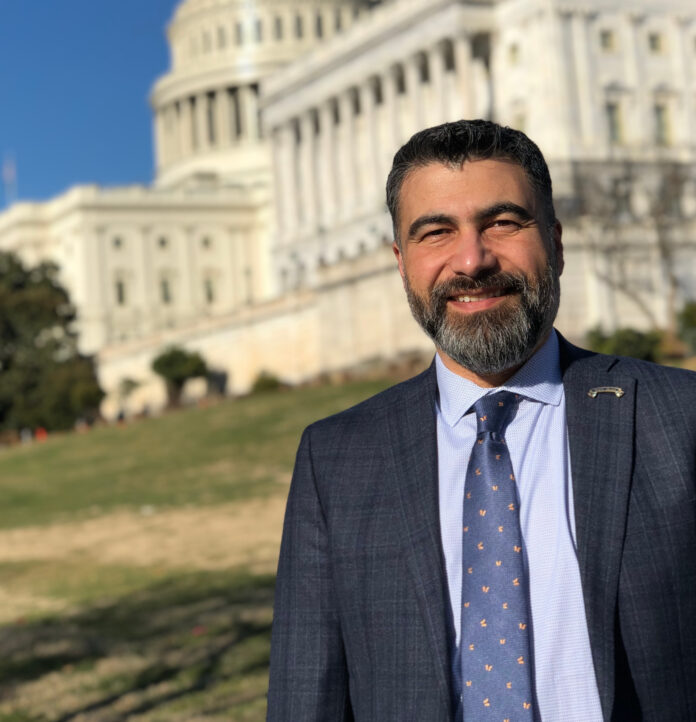
PROVIDENCE – Farouk Rajab on Thursday said there is “no clear path forward” for economic recovery of his downtown hotel that has been crippled by travel restrictions and health and safety guidelines.
Rajab, who is general manager of the Providence Marriott Downtown and chair of the Rhode Island Hospitality Association’s board of directors, says the only hope right now is vaccination. He painted a dire picture for his hotel and the entirety of the hospitality industry during an interview with Providence Business News.
“I don’t think we will come back to employment levels any time soon,” he said. “Stimulus can help my associates who have been furloughed, and keep the lights on, but it can’t stimulate travel. I can’t convince people to travel.”
“The road to recovery is through the vaccinations,” he added, while acknowledging issues associated with the rollout. “We have to work harder to make sure we have a clear plan.”
Rajab said he had 250 employees working for him pre-pandemic. “That is gone now,” he said, noting that his workforce has declined by 90% amid the pandemic to 20 employees. His hotel is filled to about 16% occupancy per day on average, “which is scary, because that is not sustainable,” he said.
Compounding the issue, is employees that were trained for roles at the hotel “have abandoned the industry” altogether. Another problem, he said, is that the pandemic has changed behavior, with people meeting via Zoom and other internet platforms instead of traveling.
“Is corporate travel going to come back?” he asked. “I think the corporations have a social responsibility to bring travel back to Rhode Island.”
Rajab said while there is hope with the vaccine, and typically an uptick in business during the summer season, Providence is not a draw that time of year. So, while hotels in Newport, Westerly and on Block Island might see 80% occupancy at that time, he anticipates that his hotel will see about 60% capacity.
“How do we entice people to come to Providence at that time?” said Rajab. “There was no Waterfire last year. There were no theaters open, or festivals. So, there are a lot of challenges we need to figure out.”
The latest data supports Rajab’s perspective.
The leisure and hospitality industry shed the highest amount of job losses from February to December of 2020, as reported by the R.I. Department of Labor and Training on Jan. 22. Its report noted that the industry lost 42% of its workforce, 30% higher than the next hardest hit sector, health services, which reported a 13% decline.
The American Hotel and Lodging Association inaugural State of the Hotel Industry 2021 report predicts the addition of 200,000 jobs in 2021 in the United States, after shedding 670,000 due to the pandemic. However, the industry’s employment level is projected to remain nearly 500,000 jobs below its pre-pandemic number of 2.3 million employees.
Other findings suggest that hotel occupancy rates will drop to an average of just 52% in 2021, compared to 66% in 2019. The onset of the COVID-19 pandemic brought United States hotel occupancy rates to a historic low of 24.5% in April 2020, while the annual occupancy rates fell to roughly 44% for the full year. Occupancy rates are projected to rebound more significantly in 2022, reaching 61.4%, and the number of rooms sold is expected to reach 1.23 billion, nearing 2019 levels.
Prior to the pandemic, the U.S. hotel industry’s 5.3 million guest rooms generated $168 billion in annual revenue, not including the additional tens of billions generated by meeting rooms and other ancillary revenue sources. In 2020, hotel room revenue fell by nearly 50% across the country to $84.6 billion. Room revenue is anticipated to increase by only $25.9 billion this year, still 34% below 2019 levels. In 2022, room revenue is projected to rebound a bit further, hitting an estimated $144 billion, but still well below 2019 numbers.
“While these numbers don’t necessarily highlight the specific impact on Rhode Island’s hotel industry, they paint a startling picture of how our colleagues across the country have been affected,” said Dale J. Venturini, CEO and president of the Rhode Island Hospitality Association.
“On a statewide level, hotels play a pivotal role in reviving our economy, from creating jobs to generating tax revenue from out-of-state visitors contributing to Rhode Island’s restaurants, small businesses, tourist attractions and more,” said Venturini. “Helping our hotels regain their footing in 2021 will not only bring much-needed revenue to the state, but it will restore vibrancy to our cities and life to our struggling businesses.”
For Rajab, he said he is searching for answers. “I have heard so many sad stories that have kept me up at night, and there is nothing I can do,” he said. “It will take a herculean effort to recover.”
Cassius Shuman is a PBN staff writer. He can be reached at Shuman@pbn.com.













Very interesting article. I’ll be following up with may be some partial solutions.